W: Do you want to hear my evil laugh?
Me: After you play the Bach.
W and I discuss a lot of things during his violin lesson. We've talked about poetry, painting, dance, sculpture, (his favorite story is me getting thrown out of the museum for sticking my fingers in Balzac's eyeholes) architecture, mathematics, history, science, running, swimming, and the ever-looming OUTSIDE. We talk about insects, books, composers, color, clouds, boats, snails and the fact that making a lanyard is never going to really be a fun thing to do…
PK: Why do you write?
RL:
HIDE WRY YOU TWO
DIE WHY YOUR TWO
WIDOWER THY YOU
RIDE WHY YOU TWO
THY DIRE WOW YOU
WIRED WHY TO YOU
WIDER WHY TO YOU
WEIRD WHY TO YOU
TIED WHY ROW YOU
EDIT WHO YOU WRY
EDIT HOW YOU WRY
DEITY OW WHY OUR
WIDE WORTHY YOU
WIDE YOU WRY HOT
WIDE WHO YOU TRY
ROT WIDE WHY YOU
TOY OUR WIDE WHY
ODE WITH YOU WRY
ODE WHY I OUT WRY
OWED HIT YOU WRY
OWED YOUTH I WRY
RED WHY I TWO YOU
DREW WHY I TO YOU
WED WORTHY I YOU
WED WHY I ROT YOU
WED WHY I OUR TOY
WED WHY TRIO YOU
DEW WORTHY I YOU
DEW HOT I YOU WRY
WIDTH YE ROW YOU
HOWDY WRITE YOU
THUD YE WIRY WOO
I'D RUE THY OW YOW
I'D WE WHO YOU TRY
I'D WE HOW YOU TRY
DIRTY WE WHO YOU
DO WE HIT YOU WRY
HOWDY YOU'RE WIT
(Because I breathe)
PK: I don't believe you. You write because you breathe. Is that true? I
breathe as well. It does not mean that I need to write or do any other
art for that matter.
Most of the times, I write to get to the other side of a thought or
image. It is a very real sense of exploration. I want to see where a
piece carries me, and then to have the satisfaction of completion,
where I look at the completed object or poem, and smile or not.
These are 2 big reasons why I write. The other is a sense of healing.
To go through a thought or image to discover a piece of myself in
certain characters, or poetic lines, that I had not known or felt
before.
There is also something about having an instrument in your hands, the
pen, a keyboard, a brush - the truth becomes so tangible, because its
your truth, each line, each note, each breadth.
Creating also makes me happy, and the love I exhibit for myself by
making time for work to happen is definitely a cog in the machine of
why I write. There is also, of course, the beautiful gift of sharing it
with the world, once exploration, completion, and self love, are
completed.
What about you, Rebecca? Why do you write today?
RL: If you don't believe me, then our interview comes to a screeching halt.
I write because I breathe.
I have written since I understood my alphabet, before I understood
language. As soon as I discovered I could push three blocks together
and form the word CAT I wanted to write.
I do not write to get to the other side of anything.
I do not write to heal.
I don't share your "satisfaction of completion" because I don't
believe art is ever static.
I don't seek truth in my writing or try to foist my truth on anyone. I
find work that does to be precious and contrived.
I'm not convinced it such a gift to "share" art.
I think there is perhaps too much "sharing" happening in the writing
world, in particular with poetry.
The act of sharing my writing makes me uncomfortable and exposed.
I continue to publish because it gratifies my enormous ego.
Having an instrument in my hand has nothing to do with writing, for
me. My writing occurs as I live day to day, observe, watch, as I
sleep, in dreams, as I run or walk or eat or make love or dance. It
never stops.
Because I am a musician, also a painter, instrument is an entirely
different conversation.
Even when I'm not conscious of it, the process of writing continues.
As does my breath.
Writing, creating, does not make me happy, in fact, I despise it a
great deal of the time. It makes me neurotic and eccentric and
frequently insane, and yet I continue to do it as I continue to
breathe.
PK: I hear you loud and clear. Why aren't you happy with your art? Why so angry?
RL: I didn't write that I wasn't happy, what I wrote was that writing and
creating do not make me happy. Mozart makes me happy. Love makes me
happy. The sea makes me happy. My son makes me happy. Puppies and
kittens make me happy. Dancing makes me happy. My garden makes me
happy. (This conversation has made me happy.) All of these beautiful
mundane things make me happy. I am not angry, but I am a
perfectionist, and being a perfectionist doesn't cohabitate happily
with art. Writing isn't particularly fun. It's intense, hot,
spectacular, dizzying, beautiful, heartbreaking. It is rewarding, yes.
I bring a philosophy of deep play into my art, but deep play also has
its shadow, its prankster nature. Writing is solitary and lonely and
oftentimes impossible. I crawl inside the words and I live with them
and I drive around with these characters that live in my poems and I
talk to them and I weep with them and I try to hear what they're
telling me. Does it make me happy? No. Maybe momentarily, but for the
long haul, no. Happiness is a tricky subject for me, though I'm
convinced of joy. I'm not sure I've ever learned how to be inside
happiness correctly. I'd like to think I still can learn it. I'd like
to think that someday it will be easy for me.
PK: Do you feel that if you lose perfectionism, you will lose something
else in the art? If so, what do you feel is at stake?
RL: Perfection has no place in art. I struggled with this for years, with
my music. If I performed and hit a wrong note, I was devastated, that
performance was ruined for me even if no one in the audience or the
orchestra knew that I made a mistake. I was finally able to let this
go. Now a performance is successful for me if I am in the music the
entire time I am playing it, if I am present, if I am paying
attention, listening and responding. I no longer worry about wrong
notes.
I haven't figured out a way to be as kind to myself with my writing.
There is no way to judge how good a piece of writing is. There is no
obvious scale, no true way of knowing if it succeeds or not.
Publication is certainly not a way to judge, nor is having a book or
two books. Every once in a while, someone responds to a poem I have
written, and this pleases me, but the poems never say exactly what I
want them to say. They tend to take on their own personalities. They
go where they want to go. I just let them out to run around the block,
screaming in their nightclothes. Painting is the same. What happens on
the canvas is never what I see in my head. In my head, things are
perfect. Once they're let out into the light, they're simply human,
therefore flawed, but also therefore loveable.
PK: Can't you avoid wrong notes in writing by 'paying attention, listening
and responding' as you do in music? What comparisons can you make
between 'being present' in music versus writing?
RL: There is no way to know what a wrong note is in writing. Other than
the obvious beginner's mistakes. It's all gray area. All I can do is
keep walking into the dark with my little flashlight and its 4 foot
beam. I can only walk into 4 feet of light at any given time. It's all
any of us can do, as writers. Writing is a forest we wander in at
night. I have a second book coming out and every single poem in the
book has to do with burning, with fire, with fever. If I could perfect
my writing, I would have been able to write about the fire with one
poem. 84 poems later and I'm still looking for it. Perhaps it is the
imperfection of writing that drives me. I write what I need to write,
and sometimes these poems and stories answer something in me and
sometimes, if I'm lucky, they answer something in my readers. After
that, I have to let them go.
A live performance of music is different. I am there, I respond to the
music with my body, my hands, my face. The audience reacts to me and
the music. I respond to the other musicians, the conductor, the
composer. There is a dynamic that is missing in the printed word,
though that vibrancy is something I strive for in my writing.
The Canadian pianist and one of my personal heroes, Glenn Gould, also
struggled with the idea of perfection in his art. He gave up a
brilliant performing career when he was 32 years old so he could go
into a recording studio and make perfect music. He came pretty close
to it, even though he hummed through all of his recorded performances.
PK: Do you hum when you write?
RL: Sometimes.
PK: Do you ever start writing a poem, and then end up on your violin
instead? Or off into a painting? Do you ever combine any of these art
forms into a piece? And, if so, how?
RL: No, I'm very focused. When I'm writing, I write. Same with painting.
But all three art forms slip around inside my head. They talk to each
other. They inform each other. They all spring from the same source of
creativity. I sometimes write during rehearsal breaks, because
rehearsing often gives me ideas for poems. I am the librettist for the
composer Roupen Shakarian. When I'm writing text for him, I am more
aware of thinking in terms of music. I'm presently writing the
libretto for an opera, Red Queen, based on the relationship between
Charles Dodgson and Alice Liddell. I'm definitely tuned into voice
while I'm working on it. Music informs my poetry, always, as far as
lyricism, line and sound goes. I have not collaborated with other
types of musicians, and I've never performed my poetry to a musical
accompaniment. I've seen that done badly so many times that it just
doesn't appeal to me at this point. I put a lot of text in my
paintings, and sometimes paint entire poems on a canvas as
under-painting. I've also printed my poems on acetate and embedded
them in my paintings. I've had my poems published alongside of
photography and other types of visual art, but that has always been
rather haphazard pairings. I have not purposefully paired my poems
with art, at least not yet. I'm strongly influenced in my poetry by
the art of Kandinsky, Diane Arbus, Gregory Crewdson, Sally Mann,
Balthus and David Lynch. These are the artists that make me want to
write, that make me want to paint.
PK: On your blog you have these great little vignettes about teaching W how to play the violin. In them, you portray yourself as an open, inventive, and caring teacher. Where does this person go when it comes time to teach yourself? Do you ever feel resistant like your students to new styles or ideas? Do you think this would be different if you were self-taught, as opposed to a classically trained musician?
RL: This is an interesting question. I love to teach. I'm good at it. I
think teaching is an art in and of itself. Violin is an extremely
demanding instrument. You have to push yourself, you have to be
willing to push your body and your brain beyond what seems, at first,
to be uncomfortable. You have to be willing to give up time to
practice. You have to be willing to bend and mold your body to fit the
instrument. The bow alone takes years to master. You have to be
willing to ache for it. Writing is the same. I teach a writing
workshop to adults that is in its 7th year. I lose patience with my
writing students when they aren't as obsessed with writing as I am,
when they miss workshop, or don't write a poem or fail to submit their
work. I push my students as hard as I push myself but I think I give
them more praise, and I think I believe harder in them than I do
myself sometimes.
I don't think I am resistant to new ideas, but my classical training
certainly has a strong influence on how I approach art, specifically
where practice is concerned. I believe that practice is key to
mastering any art, whether it is an instrument, drawing and painting,
or writing. I believe we make the most progress when we practice
diligently and appear to be getting nowhere. My blog now serves as my
writing practice. I can't imagine being self taught as far as violin
goes. I was raised in a family that was musical. My mother was an
opera singer and a piano teacher. My father tuned pianos and played
bassoon. There never was a choice to not play an instrument, though we
got to choose what instruments we wanted to play. My education was
strongly focused on violin and music history. I taught myself to write
poetry by reading, though I have taken writing classes as an adult,
and I attend a poetry workshop regularly, though I'm mostly there for
the artistic community.
PK: What kind of music would you play without those classical rules? How would your view of writing change? Would getting things right matter as much?
RLI don't follow rules either in my music or my writing. I do, however,
pay attention to structure, without which music would simply be random
notes, and poetry simply words. Without structure there would be no
lyric line, no stanza, no sentence. Think of music and poetry in terms
of architecture. A house won't stand without a foundation. In music,
the foundation is the octave, the bar line, the key signature. If you
are asking what kind of music would I play without structure, I
suppose my answer would be none. I would just make noise. As far as
getting things right, I strive for excellence. Some people are happy
with their first draft of a poem, and some people are happy learning
Twinkle Twinkle Little Star on the piano and never progressing. As far
as 'getting things right', I like to push myself. I strive for
excellence.
PK:Is it really necessary to strive for excellence? Isn't there a certain
point where you know you have worked enough on your craft, that you
have a voice, and that you can just go with it?
Like, from my perspective, you are already excellent. There's nothing
more you need to do. Just keep going with whatever you want.
It's like what one of my friends used to say to me, "Dude, you don't
need to do anything when you're performing. Just sing the songs. You
got enough presence. Just stand there. You don't need to do anything."
That's what I feel when you tell me that you are striving for
something. I feel like you're already doing the best you can. Do you
ever stop to recognize those moments? Don't you just know things will
evolve naturally? Isn't it just style and voice that you play with now?
RL:It is necessary to strive, yes. It is dangerous for an artist to
believe he or she has arrived. This is when you begin coasting and
coasting always ends in a dead stop. I am a great believer in
'beginner's mind'. It would be folly for me to think I know anything
about writing. Writing isn't a safe, well lit supermarket in which I
can wander with my basket, pulling words off the shelf. Writing is a
forest I step into everyday. It's dark and beautiful and full of
fallen trees and light and fierce animals. Once I begin to coast in my
art, I lose the sense of risk, of adventure, of discovery.
As far as stopping to bask at a finished poem or painting or
performance, of course, yes, I do that, and it's fantastic. But the
journey for me is key, that's what it's really about. As soon as I've
finished something, I'm ready to head back into the forest with my
little flashlight and have a look around.
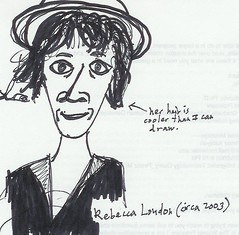
Rebecca Loudon lives and writes in Seattle. She is the author of Tarantella (Ravenna Press). Her latest poems can be seen at Typo. Radish King is her blog. Please visit the site. Then you can meet this fabulous artist, with a gift for driving stick in 4 inch heels, and writing 86 poems about fire just to see them burn in flames.

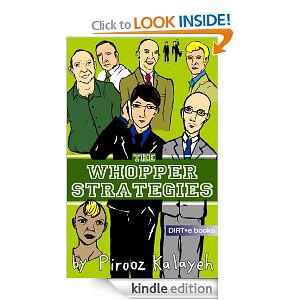
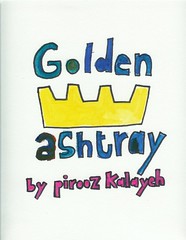

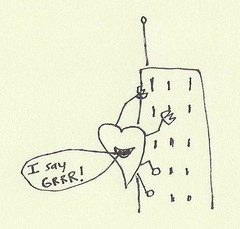

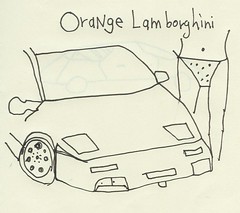





2 comments:
I am suprised no one is responding to this interview. Personally, I find it fascinating. I wonder if you do as well, Rebecca.
For me, this interview taught me how different our processes as artists are. That we may have completely different intentions when it comes to the work, but what ends up being translated to the viewer is exactly that, a translation by the viewer.
When I read Rebecca's blog and poems, I was convinced she was just like me. In some cases, we are very similar, but I would say, that there is definitely a different approach to what art is for each of us.
This is a pretty bizarre revelation for myself. Especially coming from Naropa, the city community of Newark, DE, and my own personal life. Where I come from, as artists, we work to open our hearts with the work, and if it opens those in are community, this is a most welcome possibility.
And it's not like we have any choice, right? Artists create the work, and then artists/people/viewers make their own choices about what it does for them.
When I read Rebecca's work on W, it is a very healing experience for me. I love hearing the innocence of the child, and the wit in response from R. I love the teacher student relationship, and when someone writes about it in such a way, I feel changes for reading it. It has nothing to do with excellence. Just a good talker. Just a bringing out of the internal mind. Just showing me that world underneath.
And yeah, they might be against everything I stand for, but I respect their process as what it is, and all difference shows me is how very much the same we are, and how wonderful it is to be an artists, and how false any preconceptions about what it takes to be one.
It's not perfection or being self-taught, or any of that mumbo jumbo for me. It's just completely unique to the artist. They make their choices. They stick with them. Just like how we live.
That is why I like this interview, and am proud of both Rebecca and myself for sticking with the interview, and being open to hearing and seeing one another.
What does everyone else think? Let me hear your view. And, although I'm getting plenty of personal e-mails, and I appreciate them, I would also really appreciate people to make a stand, and offer their take on this open venue.
No view is absolute. This is our personal right as artists/humans. I reserve the right to contradict myself in the very next moment. Nothing is static. So, put it out there. What do you think? How do you respond?
What's the good of our opinions if we keep them inside?
How else are we going to learn from one another?
Someone scream, "Blackjack!"
Or don't do anything. That's cool. I am just posting this to say, "Hey, where are you people? What do you think? Why do you write?"
I guess that's the biggest thing. Why do you guys write? How are you different? How are you the same?
That's how this interview helped me.
Man, interviews are pretty cool. Just imagine. An artform that you really don't have any control over. That's pretty cool.
And, so ensues my "evil laugh" and "marshmallow giggle."
P.
i was astounded how she blew away your second (2nd?) question. just totally blew it away. and from that point of seming total divergence, i thought it was amazing that the intvw held, there was diff. but no war. so i trusted that process and i guess it triggered the part of me that is always afriad of other people and their judgments (which i imagine annihilate me, or will, or could). not so. it felt brave, and yes, crazy. i agree. what a form. it moves. i imagine it was great practice for you both, as reading it was for me.
and you know, as a zen student, i am sympathetic to r.'s thoughts on discipline, although it is as easy for a person - whether being explicitly creative or no - to ruin themselves through pushing on as through slacking off. seen it, done it too.
can i just say that i love this "choose an identity" thing. you probably know who i am, but i am doing this just to tease you.
KA-ZAPf!
Post a Comment